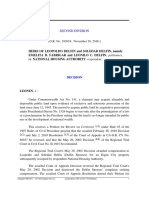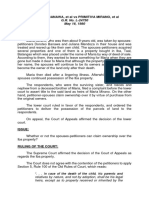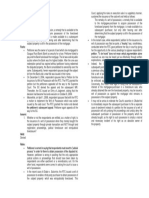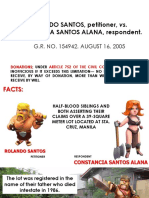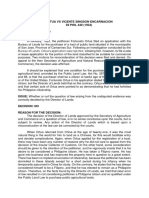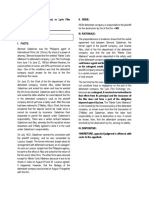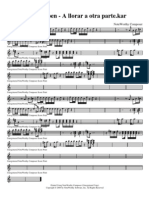Ortega Vs Valmonte
Ortega Vs Valmonte
Uploaded by
Edu RiparipCopyright:
Available Formats
Ortega Vs Valmonte
Ortega Vs Valmonte
Uploaded by
Edu RiparipOriginal Description:
Original Title
Copyright
Available Formats
Share this document
Did you find this document useful?
Is this content inappropriate?
Copyright:
Available Formats
Ortega Vs Valmonte
Ortega Vs Valmonte
Uploaded by
Edu RiparipCopyright:
Available Formats
ORTEGA VS VALMONTE
FACTS:
Two years after the arrival of Placido from the United States and at the age of 80 he wed Josefina
who was then 28 years old.
But in a little more than two years of wedded bliss, Placido died. Placido executed a notarial last
will and testament written in English and consisting of 2 pages, and dated 15 June 1983¸but
acknowledged only on 9 August 1983. The allowance to probate of this will was opposed by
Leticia, Placido’s sister.
According to the notary public who notarized the testator’s will, after the testator instructed him on
the terms and dispositions he wanted on the will, the notary public told them to come back on 15
August 1983 to give him time to prepare.
The testator and his witnesses returned on the appointed date but the notary public was out of
town so they were instructed by his wife to come back on 9 August 1983. The formal execution
was actually on 9 August 1983.
He reasoned he no longer changed the typewritten date of 15 June 1983 because he did not like
the document to appear dirty.
Petitioner’s argument: At the time of the execution of the notarial will Placido was already 83 years
old and was no longer of sound mind. Josefina conspired with the notary public and the 3 attesting
witnesses in deceiving Placido to sign it.
Deception is allegedly reflected in the varying dates of the execution and the attestation of the will.
ISSUES:
1. Whether Placido has testamentary capacity at the time he allegedly executed the will
2. Whether the signature of Placido in the will was procured by fraud or trickery
HELD:
1. YES. Despite his advanced age, he was still able to identify accurately the kinds of property he
owned, the extent of his shares in them and even their location. As regards the proper objects of
his bounty, it was sufficient that he identified his wife as sole beneficiary. The omission of some
relatives from the will did not affect its formal validity. There being no showing of fraud in its
execution, intent in its disposition becomes irrelevant.
2. NO. Fraud is a trick, secret devise, false statement, or pretense, by which the subject of it is
cheated. It may be of such character that the testator is misled or deceived as to the nature or
contents of the document which he executes, or it may relate to some extrinsic fact, in
consequence of the deception regarding which the testator is led to make a certain will which, but
for fraud, he would not have made. The party challenging the will bears the burden of proving the
existence of fraud at the time of its execution. The burden to show otherwise shifts to the
proponent of the will only upon a showing of credible evidence of fraud. Omission of some relatives
does not affect the due execution of a will. Moreover, the conflict between the dates appearing on
the will does not invalidate the document, “because the law does not even require that a notarial
will be executed and acknowledged on the same occasion. The variance in the dates of the will as
to its supposed execution and attestation was satisfactorily and persuasively explained by the
notary public and instrumental witnesses.
You might also like
- G.R. No. L-8327 December 14, 1955 ANTONINA CUEVAS, Plaintiff-Appellant, vs. CRISPULO CUEVAS, Defendant-AppelleeDocument28 pagesG.R. No. L-8327 December 14, 1955 ANTONINA CUEVAS, Plaintiff-Appellant, vs. CRISPULO CUEVAS, Defendant-AppelleeJoenalyn Mae Gamboa GalangNo ratings yet
- Mitra vs. Guevarra, Et. AlDocument3 pagesMitra vs. Guevarra, Et. AlCarie LawyerrNo ratings yet
- Surety Form No 3807Document2 pagesSurety Form No 3807Kumar RanjanNo ratings yet
- Nuguid v. Nuguid DDocument2 pagesNuguid v. Nuguid DSean GalvezNo ratings yet
- Spouses Rodrigo Imperial JRDocument3 pagesSpouses Rodrigo Imperial JRNoel Christopher G. BellezaNo ratings yet
- Insurance-Digests Complete PDFDocument67 pagesInsurance-Digests Complete PDFDesire RufinNo ratings yet
- G.R. No. 122880 Azuela Vs CastilloDocument3 pagesG.R. No. 122880 Azuela Vs CastilloGRAND LINE GMSNo ratings yet
- G.R. No. 192591 June 29, 2011 EFREN L. ALVAREZ, Petitioner, People of The Philippines, RespondentDocument1 pageG.R. No. 192591 June 29, 2011 EFREN L. ALVAREZ, Petitioner, People of The Philippines, RespondentJanfranzAbellaCasidaNo ratings yet
- Vivos, With Reservation of Beneficial Title During The Lifetime of The DonorDocument1 pageVivos, With Reservation of Beneficial Title During The Lifetime of The DonorEditha RoxasNo ratings yet
- Adelfa v. CADocument2 pagesAdelfa v. CADennis CastroNo ratings yet
- Beatriz Gonzales V CFI Manila, Benito Legarda Et Al Aquino, JDocument3 pagesBeatriz Gonzales V CFI Manila, Benito Legarda Et Al Aquino, Jkenken320No ratings yet
- Heirs of Delfin Vs NHADocument26 pagesHeirs of Delfin Vs NHAMaria Angelica DavidNo ratings yet
- UCDC v. Chung G.R. No. 173252, July 17, 2009 Quisumbing, J.Document2 pagesUCDC v. Chung G.R. No. 173252, July 17, 2009 Quisumbing, J.Arrianne ObiasNo ratings yet
- Properties of Public DominionDocument1 pageProperties of Public DominionAljay DAHANNo ratings yet
- Christian Jade C. Henson LLB-2: Alternative Dispute Resolution 1. Koppel, Inc. vs. Makati Rotary Club Foundation, IncDocument14 pagesChristian Jade C. Henson LLB-2: Alternative Dispute Resolution 1. Koppel, Inc. vs. Makati Rotary Club Foundation, IncChristian Jade HensonNo ratings yet
- Zamboanga Barter Traders V PlagataDocument2 pagesZamboanga Barter Traders V PlagatalesleyastridNo ratings yet
- EvidenceDocument156 pagesEvidenceJade Palace TribezNo ratings yet
- 5 Union Motor Corp Vs CADocument16 pages5 Union Motor Corp Vs CAShivaNo ratings yet
- Madrid-vs.-Mapoy-Martinez From EllanDocument3 pagesMadrid-vs.-Mapoy-Martinez From Ellan유니스No ratings yet
- Succession - CasesDocument14 pagesSuccession - CasesAnthea Louise RosinoNo ratings yet
- Laganapan vs. AsedilloDocument2 pagesLaganapan vs. AsedilloMarry Rose LasherasNo ratings yet
- Savage V TaypinDocument2 pagesSavage V TaypinyousirneighmNo ratings yet
- Rules On Succession Digests 1Document8 pagesRules On Succession Digests 1Adam Oliver DensenNo ratings yet
- Balus V BalusDocument5 pagesBalus V BalusHudson CeeNo ratings yet
- 1 Re - Report of Judge Vapor On The Habitual Absenteeism of VelezDocument6 pages1 Re - Report of Judge Vapor On The Habitual Absenteeism of VelezJensen FlorenNo ratings yet
- Corpus v. Cuderno PDFDocument4 pagesCorpus v. Cuderno PDFBrian Kelvin PinedaNo ratings yet
- Case Digest - Week 5.2Document80 pagesCase Digest - Week 5.2Van John MagallanesNo ratings yet
- Spouses Pastor v. CA and Quemada DigestDocument2 pagesSpouses Pastor v. CA and Quemada DigestJP Murao IIINo ratings yet
- 9 Dream Village Vs BCDADocument2 pages9 Dream Village Vs BCDAJessa LoNo ratings yet
- Santos Vs Lumbao 519 Scra 508Document1 pageSantos Vs Lumbao 519 Scra 508pja_14No ratings yet
- Case Summary (BPI vs. de Coster)Document3 pagesCase Summary (BPI vs. de Coster)Alfredo BentulanNo ratings yet
- CT4. Garcia v. ThioDocument2 pagesCT4. Garcia v. ThioJaypoll DiazNo ratings yet
- Fortich Vs CoronaDocument8 pagesFortich Vs CoronaMac Burdeos CamposueloNo ratings yet
- Nacar v. Gallery FramesDocument4 pagesNacar v. Gallery FramesKaren Ryl Lozada BritoNo ratings yet
- Digest Caiza v. CADocument3 pagesDigest Caiza v. CAKylie Kaur Manalon DadoNo ratings yet
- NPC Vs MaruhomDocument1 pageNPC Vs MaruhomPB AlyNo ratings yet
- Rendell-Baker v. Kohn, 457 U.S. 830 (1982)Document19 pagesRendell-Baker v. Kohn, 457 U.S. 830 (1982)Scribd Government DocsNo ratings yet
- 17 Ungab-Valeroso vs. Ungab-GradoDocument11 pages17 Ungab-Valeroso vs. Ungab-GradoJanine RegaladoNo ratings yet
- BPI Employees Union-Davao v. BPI, July 24, 2013Document2 pagesBPI Employees Union-Davao v. BPI, July 24, 2013bernadeth ranolaNo ratings yet
- Revilla vs. CADocument15 pagesRevilla vs. CAJoseph Dimalanta DajayNo ratings yet
- Credit Transactions by Pineda PDFDocument12 pagesCredit Transactions by Pineda PDFNyl John Caesar GenobiagonNo ratings yet
- Madrid Vs MapoyDocument2 pagesMadrid Vs MapoyMishal OisinNo ratings yet
- Doroteo Banawa, Et Al Vs Primitiva Mirano, Et AlDocument2 pagesDoroteo Banawa, Et Al Vs Primitiva Mirano, Et AlShalena Salazar-SangalangNo ratings yet
- Gonzaga v. CA, 51 SCRA 381 (1973)Document1 pageGonzaga v. CA, 51 SCRA 381 (1973)Lovely Grace HechanovaNo ratings yet
- Ledesma vs. CA 278 S 656Document1 pageLedesma vs. CA 278 S 656Emman CenaNo ratings yet
- Teston v. DBPDocument1 pageTeston v. DBPMark AngeloNo ratings yet
- Microsoft vs. Maxicorp, G.R. No. 140946, Sept. 13, 2004Document9 pagesMicrosoft vs. Maxicorp, G.R. No. 140946, Sept. 13, 2004Angelo CastilloNo ratings yet
- Villarico v. Sarmiento: Accion Publiciana Against Respondents Alleging That Respondents' Structures OnDocument2 pagesVillarico v. Sarmiento: Accion Publiciana Against Respondents Alleging That Respondents' Structures OnKiethe MyraNo ratings yet
- Vs. Relova 132 SCRA 237 242 (1984), This Court HeldDocument2 pagesVs. Relova 132 SCRA 237 242 (1984), This Court HeldcharmdelmoNo ratings yet
- Philamcare Health Systems v. CADocument3 pagesPhilamcare Health Systems v. CADeyna MaiNo ratings yet
- 62 Gonzales Vs PCIBDocument2 pages62 Gonzales Vs PCIBStefanRodriguezNo ratings yet
- Javate v. Spouses Tiotuico G.R. No. 187606 March 9, 2015 DoctrineDocument1 pageJavate v. Spouses Tiotuico G.R. No. 187606 March 9, 2015 DoctrineMarion KhoNo ratings yet
- ROLANDO SANTOS, Petitioner, vs. CONSTANCIA SANTOS ALANA, RespondentDocument14 pagesROLANDO SANTOS, Petitioner, vs. CONSTANCIA SANTOS ALANA, RespondentKobe BullmastiffNo ratings yet
- Manila Wine Merchants vs. CIR, G.R. No. L-26145, February 25, 1984Document1 pageManila Wine Merchants vs. CIR, G.R. No. L-26145, February 25, 1984Ayra CadigalNo ratings yet
- Chapter 1 The Nature of International Law What Is International Law?Document7 pagesChapter 1 The Nature of International Law What Is International Law?Ruby RoxasNo ratings yet
- Prudential Bank V PanisDocument1 pagePrudential Bank V Panisgnrslash01No ratings yet
- Proton V BanqueDocument2 pagesProton V BanqueHoney Joy MBNo ratings yet
- Metro Drug Vs NarcisoDocument2 pagesMetro Drug Vs Narcisotwisted_pascalNo ratings yet
- Tuatis v. Escol - DigestDocument2 pagesTuatis v. Escol - DigestCarla Mae MartinezNo ratings yet
- Tago vs. Comelec and Limbona G.R. NO. 216158Document3 pagesTago vs. Comelec and Limbona G.R. NO. 216158riverman89No ratings yet
- Ortega Vs ValmonteDocument2 pagesOrtega Vs ValmonteVinci PoncardasNo ratings yet
- Marites Bernardo Et Al Vs NLRCDocument2 pagesMarites Bernardo Et Al Vs NLRCEdu RiparipNo ratings yet
- Bitoy Javier Vs Fly AceDocument2 pagesBitoy Javier Vs Fly AceEdu RiparipNo ratings yet
- Kalaw Vs MercadoDocument1 pageKalaw Vs MercadoEdu RiparipNo ratings yet
- Petitioners Vs Vs Respondents: Third DivisionDocument18 pagesPetitioners Vs Vs Respondents: Third DivisionEdu RiparipNo ratings yet
- Admin Law Midterms Reviewer (Final)Document58 pagesAdmin Law Midterms Reviewer (Final)Edu Riparip100% (1)
- Melencio v. Dy Tiao LayDocument10 pagesMelencio v. Dy Tiao LayEdu RiparipNo ratings yet
- Pardell y Cruz v. Bartolome y EscribanoDocument10 pagesPardell y Cruz v. Bartolome y EscribanoEdu RiparipNo ratings yet
- Twin Towers Condominium Corp. v. CADocument22 pagesTwin Towers Condominium Corp. v. CAEdu RiparipNo ratings yet
- Siari Valley Estates Inc. v. Lucasan (Supra)Document4 pagesSiari Valley Estates Inc. v. Lucasan (Supra)Edu RiparipNo ratings yet
- Punsalan v. LiatDocument4 pagesPunsalan v. LiatEdu RiparipNo ratings yet
- Cruz v. Court of AppealsDocument6 pagesCruz v. Court of AppealsEdu RiparipNo ratings yet
- Albano LMT Political LawDocument5 pagesAlbano LMT Political LawEdu Riparip0% (1)
- Mills Music, Inc. v. Snyder, 469 U.S. 153 (1985)Document31 pagesMills Music, Inc. v. Snyder, 469 U.S. 153 (1985)Scribd Government DocsNo ratings yet
- Wing On & Co. v. Syyap (64 OG 8311)Document8 pagesWing On & Co. v. Syyap (64 OG 8311)Anit EmersonNo ratings yet
- Riding Lesson AgreementDocument1 pageRiding Lesson Agreementapi-329825771No ratings yet
- Case123 Ortua Vs Singson Encarnacion DigestDocument1 pageCase123 Ortua Vs Singson Encarnacion DigestCayen Cervancia Cabiguen100% (1)
- Article 1257 Stipulation Pour Autrui (Uy Vs Leonard)Document2 pagesArticle 1257 Stipulation Pour Autrui (Uy Vs Leonard)Dane Figuracion100% (2)
- Easements or ServitudesDocument37 pagesEasements or ServitudesAngelo LajarcaNo ratings yet
- Land AcquisitionDocument6 pagesLand AcquisitionRubab Malik PowerNo ratings yet
- Complete Download A Field Guide to Native Flora Used by Honeybees in Tasmania Mark Leech PDF All ChaptersDocument44 pagesComplete Download A Field Guide to Native Flora Used by Honeybees in Tasmania Mark Leech PDF All ChapterselmisyhaneNo ratings yet
- International Films China Vs Lyric Film ExchangeDocument1 pageInternational Films China Vs Lyric Film ExchangeFrancis MasiglatNo ratings yet
- Extrajudicial Settlement With Sale of Real PropertyDocument11 pagesExtrajudicial Settlement With Sale of Real PropertyTobal Frnandz100% (3)
- Case Digest: J.G. Summit v. CADocument5 pagesCase Digest: J.G. Summit v. CADianne Cadorna100% (1)
- NTEU Lawsuit - 2019 ShutdownDocument15 pagesNTEU Lawsuit - 2019 ShutdownFedSmith Inc.No ratings yet
- Strong: Words and Music by Hannah Reid, Dominic Major and Daniel RothmanDocument4 pagesStrong: Words and Music by Hannah Reid, Dominic Major and Daniel RothmanNienke van HorenNo ratings yet
- Cheque Bounce - Avtar SinghDocument5 pagesCheque Bounce - Avtar SinghShobha SinghNo ratings yet
- FRONT MOOT JS RanaDocument10 pagesFRONT MOOT JS RanaRoop ChaudharyNo ratings yet
- The Indian Partnership ActDocument7 pagesThe Indian Partnership Actali_raza_100% (1)
- A Llorar A Otra Parte - TrompetaDocument1 pageA Llorar A Otra Parte - Trompetaandresrilo4368No ratings yet
- FD - Family Law-IIDocument9 pagesFD - Family Law-II19103 JOTSAROOP SINGHNo ratings yet
- Duran Vs DuranDocument4 pagesDuran Vs DuranSyElfredGNo ratings yet
- Case 4-19 Digest: G.R. No. 21572 - Llenares vs. ValdeavellaDocument2 pagesCase 4-19 Digest: G.R. No. 21572 - Llenares vs. Valdeavellazaira auxteroNo ratings yet
- Director's RemunerationDocument3 pagesDirector's Remunerationzxchua3No ratings yet
- Ca Form 19-02 PDFDocument3 pagesCa Form 19-02 PDFmohanNo ratings yet
- CrossFit DFW WaiverDocument1 pageCrossFit DFW WaiverCourtneygilesNo ratings yet
- Residential Lease Agreement: Free Real Estate FormsDocument6 pagesResidential Lease Agreement: Free Real Estate FormsCoup Cree0% (1)
- Manila Electric Co. vs. City of Manila (Digest)Document1 pageManila Electric Co. vs. City of Manila (Digest)Jefferson IndapNo ratings yet
- Cat 484-11Document3 pagesCat 484-11rsiddharth2008No ratings yet
- Request Letter For No Pending CaseDocument2 pagesRequest Letter For No Pending CaseJoneNo ratings yet
- Raafe Sarfaraz: DHL PakistanDocument2 pagesRaafe Sarfaraz: DHL PakistanAhmed RazaNo ratings yet
- Basic Sales LawDocument152 pagesBasic Sales LawNeil Owen De JesusNo ratings yet











